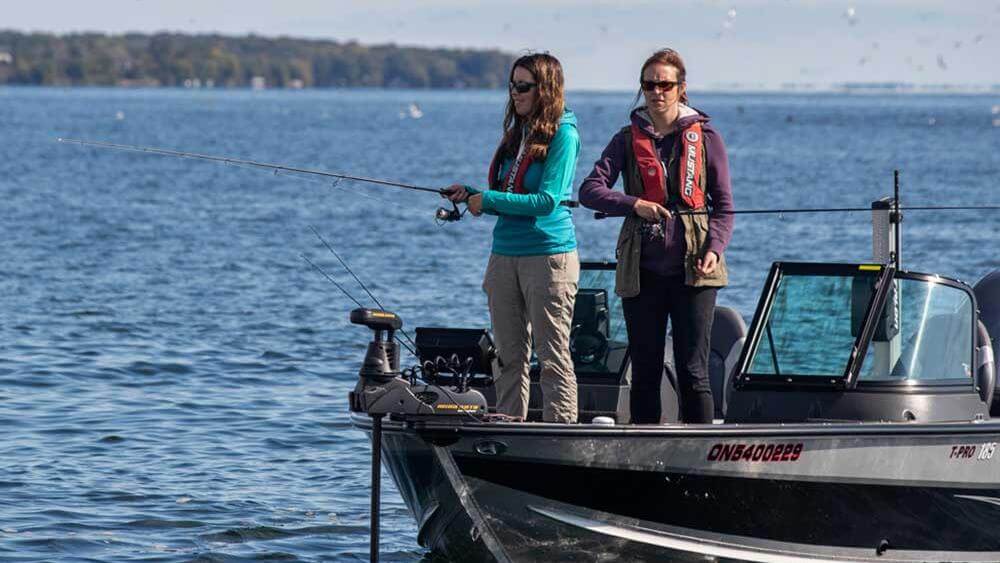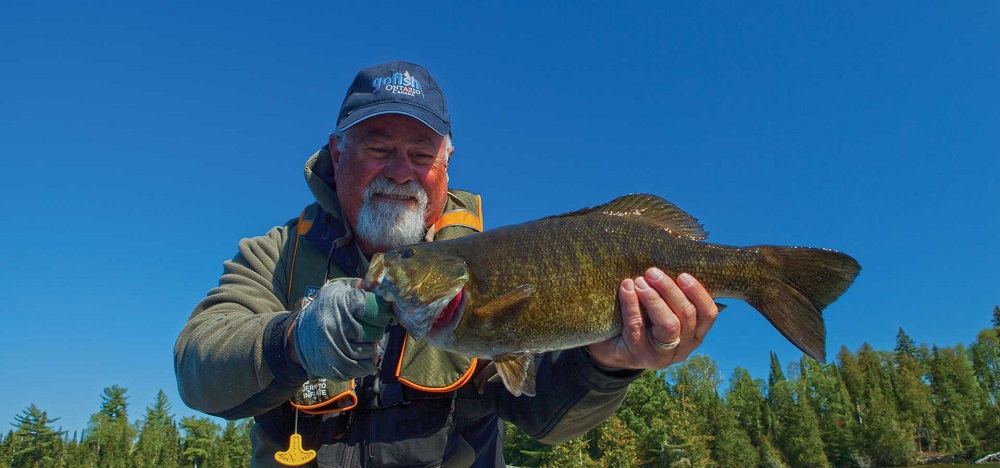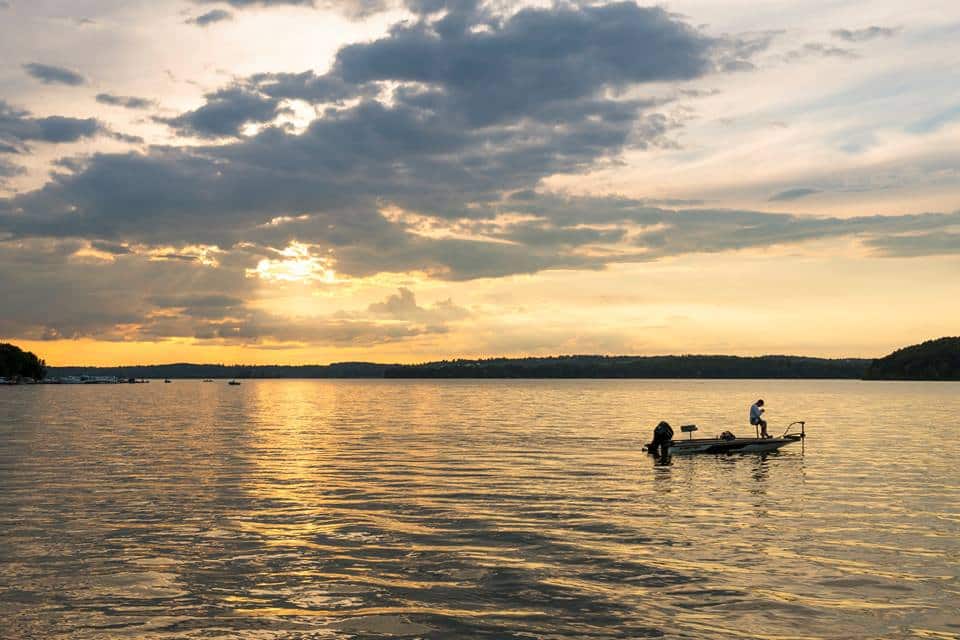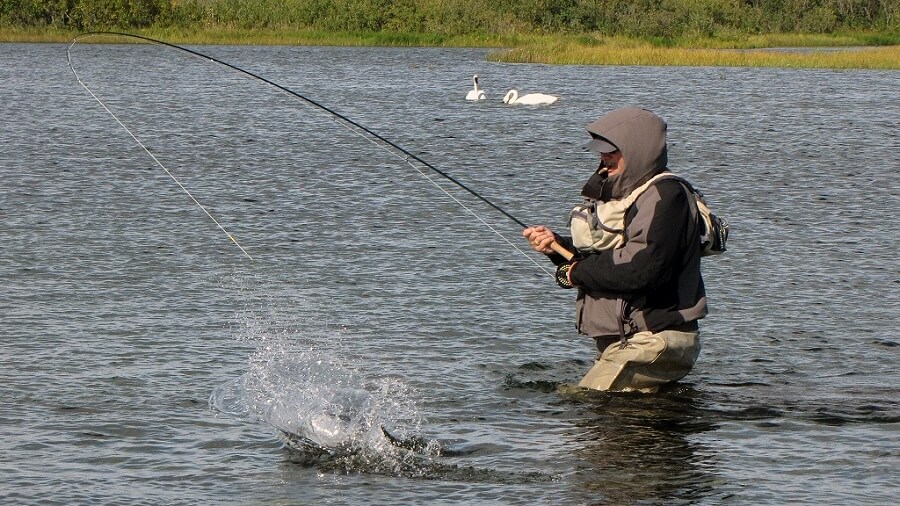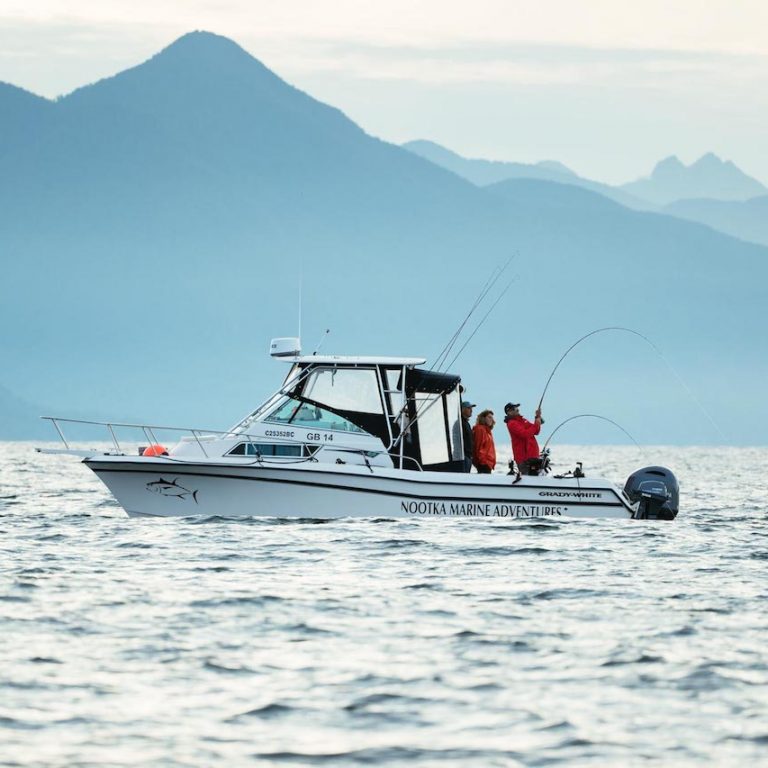Fishing enthusiasts often struggle to find the best fishing destinations in Canada. They waste time and money exploring various locations without guaranteeing a successful fishing experience.
Imagine spending hours researching and planning a fishing trip, only to end up in a lacklustre location with minimal fish activity. It’s frustrating and disheartening for passionate anglers who crave thrilling fishing adventures.
Discover the best fishing destinations in Canada with our comprehensive guide. We have carefully curated a list of top-notch spots that guarantee an unforgettable fishing experience. From pristine lakes to majestic rivers, we’ve done the research so you can focus on reeling in trophy-worthy catches.
Whether you’re a seasoned angler or just starting, our guide provides detailed information on each destination, including fish species, peak seasons, regulations, and local tips. With our help, you can maximize your chances of landing that trophy fish while enjoying the breathtaking beauty of Canada’s wilderness.
Don’t waste time and energy guessing where to go for your next fishing adventure. Trust our expertise and embark on an epic angling journey in Canada’s best fishing destinations.
What are the Best Places to Go Fishing in Canada?
Canada has many great fishing spots, but which are the best? To find out, we looked at reviews from various online sources and consulted with experts. Here are the five best places to go fishing in Canada:
1. The Gros Morne National Park
The Gros Morne National Park is a stunning natural wonder offering various recreational activities in Newfoundland and Labrador, Canada. While it is renowned for its breathtaking landscapes, hiking trails, and geological formations, fishing is also popular in the park.
The park boasts several pristine freshwater lakes and rivers home to various fish species. Anglers can try to catch Atlantic salmon, brook trout, Arctic char, and more. The tranquil waters provide an ideal setting for experienced fishermen and beginners to cast their lines.
Fishing in Gros Morne National Park not only offers an opportunity to enjoy the sport but also allows visitors to immerse themselves in the serene beauty of nature. Under towering cliffs and lush forests, anglers can relax and unwind while waiting for the fish to bite.
It is important to note that fishing regulations apply within the park to ensure sustainable practices. Visitors are advised to obtain the necessary permits and familiarize themselves with any specific rules or restrictions before embarking on their fishing adventure.
2. Cape Breton Island
Cape Breton Island, located in Nova Scotia, is known for its rich fishing heritage. The island’s coastal waters offer a bountiful array of fish species, making it a haven for fishing enthusiasts.
Fishing has played a significant role in the economy and culture of Cape Breton Island for centuries. The island’s diverse marine ecosystem supports various fish species, including Atlantic salmon, trout, mackerel, cod, and haddock. These abundant fishing grounds attract anglers worldwide who seek to experience the thrill of reeling in their catch.
Whether you are an experienced angler or a novice looking to try fishing, Cape Breton Island offers numerous opportunities to indulge in this popular activity. From casting your line off the rugged shores to exploring the island’s pristine lakes and rivers, there is something for everyone.
In addition to recreational fishing, commercial fishing also plays a vital role in Cape Breton’s economy. Many local communities rely on the industry as a source of employment and income. Fishing vessels can often be seen dotting the horizon as they venture out into the Atlantic Ocean to bring back their fresh catches.
Visitors to Cape Breton Island can immerse themselves in this rich fishing heritage by participating in guided fishing tours or visiting local harbours and wharves where fishermen unload their daily hauls. The island also hosts yearly fishing festivals and events celebrating this time-honoured tradition.
3. Prince Edward Island
Prince Edward Island, located on the east coast of Canada, is renowned for its rich fishing heritage. Fishing plays a significant role in the island’s economy and culture, making it a popular destination for anglers and seafood enthusiasts.
The island’s coastal waters teem with diverse fish species, including Atlantic salmon, mackerel, cod, haddock, and lobster. The pristine environment and nutrient-rich waters create an ideal habitat for these marine creatures.
Fishing in Prince Edward Island offers various opportunities for both recreational and commercial purposes. Anglers can enjoy casting their lines from the shore or venture out into the open sea on chartered fishing boats. The island’s numerous rivers and streams also provide excellent spots for freshwater fishing.
Commercial fishing is a vital industry on Prince Edward Island, with many local communities relying on it for their livelihoods. Lobster fishing is particularly prominent here, with PEI being known as the “Lobster Capital of the World.” The annual lobster season attracts locals and tourists eagerly awaiting the opportunity to indulge in this delectable crustacean.
Visitors to Prince Edward Island can experience firsthand the island’s fishing traditions by participating in guided tours or visiting working harbours where they can witness fishermen unloading their catch. Additionally, many restaurants offer fresh seafood dishes made from locally sourced ingredients – a culinary delight for seafood lovers.
4. Vancouver Island
Its diverse marine ecosystem and abundant fish populations offer a premier fishing experience for recreational and professional anglers.
The island’s coastal waters boast an impressive variety of fish species, including salmon (such as Chinook, Coho, and Sockeye), halibut, lingcod, rockfish, and more. These waters allow anglers to engage in various fishing techniques, such as trolling, fly fishing, and bottom fishing.
Vancouver Island is home to numerous fishing charters and outfitters who cater to individuals or groups seeking unforgettable angling adventures. These experienced guides possess in-depth knowledge of the local waters and can assist visitors in navigating the best spots for their desired catch.
Whether you are an experienced angler or a novice looking to try fishing for the first time, Vancouver Island offers something for everyone. Its stunning coastal scenery, combined with the thrill of reeling in a prized catch, creates an unforgettable experience that keeps visitors returning year after year.
5. British Columbia
With its vast coastline, numerous rivers, and pristine lakes, this province offers diverse recreational and professional anglers’ fishing experiences.
Fishing in British Columbia is known for its exceptional salmon runs. Five species of Pacific salmon – Chinook, Coho, Sockeye, Pink, and Chum – migrate through the province’s waters each year, attracting anglers from around the world. Whether you prefer fly fishing in remote rivers or casting your line from a boat in the open ocean, there are countless opportunities to reel in these prized fish.
Besides salmon fishing, British Columbia offers excellent angling for other species, such as steelhead trout, halibut, lingcod, and sturgeon. The province’s rivers are home to some of the largest steelhead populations in North America and attract avid fly fishermen seeking a challenging catch.
In addition to its coastal and river fisheries, British Columbia boasts numerous lakes that are teeming with various freshwater fish species. From rainbow trout to bass to walleye and more, anglers can enjoy casting their lines into crystal-clear waters surrounded by breathtaking mountain scenery.
6. Manitoba
One of the most popular fishing destinations in Manitoba is Lake Winnipeg. Known as the “Walleye Capital of the World,” this massive lake provides ample opportunities to catch trophy-sized walleye. In its pristine waters, anglers can target other species, such as northern pike and yellow perch.
Aside from Lake Winnipeg, Manitoba boasts numerous other fishing hotspots. The province is home to countless lakes and rivers teeming with various fish species, including trout, bass, muskie, and catfish. From remote wilderness areas to easily accessible spots near major cities like Winnipeg, anglers can find a fishing experience that suits their preferences.
Manitoba’s fishing season typically runs from May to October when the waters are open for angling. Anglers can choose between ice fishing during winter or casting their lines during warmer seasons.
To ensure sustainable fishing practices and conservation efforts, Manitoba has regulations regarding limits on catch size and species-specific restrictions. Anglers need to familiarize themselves with these regulations before embarking on their fishing adventures.
7. Ontario
The province has numerous fish species, including bass, trout, pike, walleye, and muskie. Anglers can enjoy both freshwater and saltwater fishing experiences in Ontario.
Ontario’s lakes are particularly popular among fishing enthusiasts. From the Great Lakes like Lake Superior and Lake Huron to smaller inland lakes such as Lake Simcoe and Lake Nipissing, there is no shortage of options for anglers to explore. These lakes offer excellent opportunities for various fishing techniques, such as trolling, casting, or fly fishing.
In addition to the lakes, Ontario boasts an extensive network of rivers and streams that provide exciting angling adventures. Rivers like the Grand River and the Credit River offer excellent opportunities for fly-fishing enthusiasts seeking trout or salmon.
8. Montana
Montana, Canada, is a popular destination for fishing enthusiasts. Located in the western part of Canada, Montana offers a variety of fishing opportunities for both locals and tourists alike. With its pristine lakes, rivers, and streams, this region is known for its abundant fish populations and breathtaking natural beauty.
Anglers visiting Montana can enjoy a wide range of fishing experiences. Whether you prefer fly fishing in the crystal-clear waters of the Rocky Mountains or casting your line into one of the many lakes or rivers, there is something for everyone. The region is home to several fish species, including trout, salmon, pike, walleye, and more.
Montana’s fishing industry is well-regulated to ensure sustainable practices and conservation efforts. Anglers must obtain proper licenses and adhere to catch limits and regulations set by local authorities. This ensures that the fish populations remain healthy and thriving for future generations.
How do you find the best fishing spots in Canada?
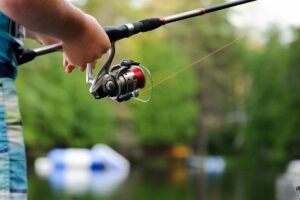
If you’re looking for fresh seafood, you’ll want to check out some of Canada’s best fishing spots. Here are five of the best places to go fishing in Canada.
1. The Gulf of St. Lawrence is a great place to fish for Atlantic salmon, trout, and halibut. You can also find brook trout and other fish here.
2. The Quebec City Area – This area is known for its abundance of smallmouth and largemouth bass. You can also catch trout, salmon, and even whitefish here
3. The Central Ontario Area is a great place to fish for muskellunge, northern pike, and lake trout. You can also find rainbow trout here.
4. The Muskoka Region – This region is home to many different types of fish, including whitefish, largemouth bass, and bluegill. You can also find carp and catfish here.
5. The Baffin Island Area is a great place to fish for Arctic char, black bear, and caribou. You can also find walleye, pike, and muskellunge here.
6. The Southwestern Ontario Area is well known for its muskellunge and lake trout abundance. You can also find northern pike, walleye, and smallmouth bass here.
7. The British Columbia Area is a great place to fish for Arctic char and halibut. You can also catch some native species, such as bull trout, here.
8. The Lake Superior Area – This is a great place to fish for lake trout, grayling, and whitefish, among other species.
9. The Mississippi River Area – This region is known widely for its abundance of rainbow trout, brown and brook trout, shad and crappie.
10. The Erie Area – This area is known for its abundance of brown trout, brook trout, and lake whitefish, among other species.
11. The Hudson River Area – This region is noted for its abundance of salmon, rainbow trout, lake trout, and other species such as bass and pikeminnow.
12. The Susquehanna Area – This area is known widely for its abundance of muskellunge and northern pike, among other species in the region.
13. The Ohio River Area – This area is well known for its abundance of walleye and smallmouth bass in this part of the country
14. The Potomac River Area – This area is well known for its abundance of muskellunge, smallmouth bass, and striped bass in this part of the country.
15. The Hudson River Area – This area is well known for its abundance of salmon and sea trout within this region.
16. The Susquehanna Area – This area is well known for its abundance of walleye, muskellunge, and northern pike.
17. The Potomac River Area – This area is noted for its abundance of muskellunge and large-mouthed bas
18. The Ohio River Area – This area is noted for its abundance of walleye, smallmouth bass, muskie minnow, largemouth bass, and white crappie, as well as other species found in the region

Popular fish in Canada
Canada is a haven for fishing enthusiasts, offering various fish species that attract anglers worldwide. This section will explore some of the most popular fish found in Canada’s waters.
1. Walleye: Known for its delicious taste and challenging fight, walleye is highly sought after by anglers. It can be found in lakes and rivers across Canada, with prime fishing spots including Ontario, Manitoba, and Saskatchewan.
2. Lake trout: Considered a prized catch among freshwater anglers, they are known for their size and strength. They inhabit deep cold-water lakes such as Great Bear Lake in the Northwest Territories and Lake Superior in Ontario.
3. Muskellunge: Often referred to as “muskie,” muskellunge is an apex predator that offers an exhilarating fishing experience. These aggressive fish can be found in Canadian provinces like Ontario and Quebec.
4. Northern pike: Another formidable predator, the northern pike, is known for their aggressive strikes and acrobatic fights. Anglers can target them in lakes and rivers throughout Canada, with popular locations including Alberta’s Athabasca River and Manitoba’s Red River.
5. Atlantic salmon: Renowned for their fighting abilities and impressive leaps out of water, they attract avid anglers to eastern Canadian provinces such as Newfoundland, Labrador, or New Brunswick.
6. Smallmouth bass: Widely distributed across Canada’s freshwater systems, they offer exciting angling opportunities due to their strong fighting ability. Popular destinations include Ontario’s Thousand Islands region or British Columbia’s Okanagan Valley.
7. Rainbow trout: A favorite among fly fishermen, rainbow trout can be found in numerous rivers and lakes across Canada. Notable locations include British Columbia’s Fraser River and Alberta’s Bow River.
8. Brook trout: Known for their vibrant colors and elusive nature, they are native to many Canadian streams and remote lakes. They can be found in Quebec, Newfoundland, Labrador, and Nova Scotia.
9. Salmon: Canada’s coastal waters are home to various species of salmon, including chinook, coho, and sockeye. These prized fish attract anglers to locations like British Columbia’s Fraser River or the Bay of Fundy in Nova Scotia.
Fishing Vacations in Canada
Several key factors must be considered when planning a fishing vacation in Canada. Firstly, the region or province you choose will greatly impact the type of fish species you can target. Each area offers unique angling opportunities, from salmon and trout in British Columbia to walleye and pike in Ontario.
Additionally, the time of year plays a crucial role in determining the success of your fishing trip. Spring and summer months are typically popular for freshwater fishing, while autumn brings opportunities for salmon runs along coastal areas.
Canada boasts numerous fishing lodges and resorts that cater specifically to anglers. These establishments provide comfortable accommodations and access to prime fishing spots. Many offer guided excursions led by experienced local guides with extensive knowledge about the area’s fish populations and techniques.
Whether you prefer fly-fishing in remote wilderness areas or casting from a boat on a picturesque lake, Canada has something to offer every angler. The country’s commitment to conservation ensures that its fisheries remain healthy and sustainable for future generations.
Salt Water Fishing in Canada
Saltwater fishing in Canada offers a thrilling and diverse experience for anglers of all levels. With its vast coastline, pristine waters, and abundant marine life, Canada is a prime destination for saltwater fishing enthusiasts.
The coastal regions of Canada, including British Columbia, Nova Scotia, Newfoundland, and Labrador, offer a wide range of saltwater fishing opportunities. Anglers can target various species such as salmon, halibut, cod, haddock, tuna, and more.
British Columbia’s Pacific coast is renowned for its trophy-sized salmon runs. From Chinook (King) salmon to Coho (Silver) salmon, anglers can enjoy thrilling battles with these prized fish. The province also offers opportunities for bottom fishing, targeting halibut and lingcod.
On the Atlantic side of Canada, Nova Scotia boasts excellent saltwater fishing options. The region is famous for its world-class tuna fishing, with giant Bluefin tuna being the ultimate prize. Additionally, anglers can target species like mackerel and striped bass along the picturesque coastline.
Newfoundland and Labrador are known for their rugged beauty and incredible angling opportunities. Here, you can find some of the best Atlantic salmon rivers in the world and fantastic cod fishing experiences.
Knowing local regulations and licensing requirements is essential when planning a saltwater fishing trip in Canada. Hiring an experienced guide or charter service can enhance your chances of success while ensuring compliance with conservation measures.
Whether you are an experienced angler seeking trophy fish or a beginner looking to try saltwater fishing for the first time, Canada offers unparalleled opportunities to indulge in this exciting sport.
Freshwater Fishing in Canada
Canada’s freshwater fishing destinations are renowned for their abundance of fish species, including trout, salmon, pike, walleye, bass, and more. Whether you are a beginner or an experienced angler, there is something for everyone in the diverse freshwater ecosystems across the country.
From coast to coast, Canada boasts numerous world-class fishing spots. In British Columbia, anglers can experience thrilling salmon fishing on the famous Fraser River or reel in trophy-sized trout in the pristine waters of Vancouver Island. Ontario is another hotspot for freshwater fishing enthusiasts, with its countless lakes and rivers teeming with various fish species.
The abundance of fish and the breathtaking natural scenery surrounding these fishing destinations sets freshwater fishing in Canada apart. Picture yourself casting your line against a backdrop of majestic mountains or tranquil forests – it’s an experience that combines nature’s beauty with the thrill of landing your following catch.
Whether you prefer fly-fishing on remote rivers or enjoy the convenience of well-equipped fishing lodges with professional guides, Canada has options to suit every angler’s preferences. Additionally, many provinces offer licenses and permits specifically tailored to non-resident anglers who wish to explore their waters.
It’s important to note that regulations regarding catch limits and licensing requirements may vary depending on the specific region within Canada. Therefore, it is advisable to research and familiarize yourself with local guidelines before embarking on your freshwater fishing adventure.
There are a ton of different lakes to choose from, but some of the best ones include Lake Nipissing, Temiskaming Shores, and Wabigoon Lake.
Plenty of fish species in lakes include perch, walleye, pike, shad, and bass. Freshwater Fishing in Canada. If you’re looking for a more relaxing fishing experience where you can sit back on your boat and enjoy nature, head to one of Canada’s beautiful rivers. Some of the best rivers to check out include:
Bow River is in Alberta, Kootenay River is in British Columbia (BC), and Bowron River is in Saskatchewan ( Saskatchewan).
The Bow River and Kootenay River offer some of Canada’s best fishing for rainbow trout. There are plenty of different fish species to catch on these rivers, with rainbow trout being one of the most highly sought-after.
If you decide to go fishing while on a river, remember that many rivers close during the winter months, so be sure to check before booking your trip—Freshwater Fishing in Canada. Head to a freshwater lake or pond if you want something more leisurely.
Some of the best freshwater lakes include Moose Mountain Lake (Alberta), Pigeon Lake (Manitoba), Wabiskawjigwan Lake (Ontario ) and Shoal Lake (Ontario). This type of fishing provides plenty of different species of fish to catch, with most anglers targeting the walleye.
These lakes are worth checking out if you’re after some walleye fishing in Canada. While freshwater fishing in Canada is excellent from a sporting perspective, finding a location to fish without infringing on another person’s rights can be difficult.
Very few places allow for private property access without running into an issue. As such, many people start fishing on public land governed by the laws of Canada and its provinces and territories.
However, if you do decide to do so, there are certain things that you should keep in mind. For example, you should never fish on private property unless you have permission or the landowner has already given you such a license.
You should also ensure you have a proper license and any fishing gear to catch your fish. In addition, if your plans include participating in fishing tournaments or catching large numbers of fish, be sure to obtain the necessary permits required by law.
These permits are reasonably easy to get but require paperwork and application forms. Fishing tournaments usually require these forms and applications six months before the tournament. You can apply for them at various locations across Canada, including your local provincial government offices.
Best walleye fishing in Canada
Whether you are a seasoned angler or a beginner looking to reel in your first walleye, Canada has plenty of destinations that cater to all skill levels.
Lake Winnipeg in Manitoba is one of Canada’s top spots for walleye fishing. Known as the “Walleye Capital of the World,” this massive lake boasts an abundance of trophy-sized walleye. Anglers flock here year-round to enjoy open water and ice fishing for these prized fish.
Another popular destination for walleye enthusiasts is Ontario’s Sunset Country region. With thousands of lakes and rivers to explore, this area offers endless opportunities to catch walleye. From remote wilderness lakes to easily accessible drive-in lodges, anglers can choose from various settings to suit their preferences.
Saskatchewan also deserves mention when it comes to exceptional walleye fishing. The province’s numerous lakes and rivers provide ample habitat for these fish species. Places like Tobin Lake and Lake Diefenbaker have gained recognition among anglers seeking trophy-sized walleyes.
In addition to these well-known locations, other provinces such as Alberta, Quebec, and British Columbia also offer excellent walleye fishing experiences. Each region has unique charm and angling opportunities that attract locals and visitors alike.
When planning your next fishing adventure in Canada, consider accessibility, accommodations, regulations, and local guides or outfitters who can enhance your experience on the water. Remember to check licensing requirements and any specific regulations about catch limits or size restrictions before you embark on your trip.
FAQ
Where do You Fish in Canada?
Canada is a haven for fishing enthusiasts, offering many breathtaking locations to cast your line. Whether you’re an avid angler or just starting, Canada’s diverse landscapes provide endless opportunities for fishing adventures.
From the pristine lakes of Ontario and Quebec to the rugged coastlines of British Columbia and Newfoundland, there are countless spots to explore. Inland, you can find popular destinations such as the Great Lakes, where trophy-sized fish like trout, salmon, and walleye await. Alternatively, head to the coastal regions for thrilling saltwater fishing experiences targeting species like halibut, cod, and salmon.
When planning your fishing trip in Canada, consider the time of year and the specific species you wish to target. Different regions have their peak seasons for various fish species. Additionally, check local regulations regarding licenses and catch limits to ensure a responsible angling experience.
Whether you prefer fly fishing in crystal-clear mountain streams or deep-sea fishing in the Atlantic or Pacific Ocean, Canada has something for every angler.
Where is a good place to fish in Canada?
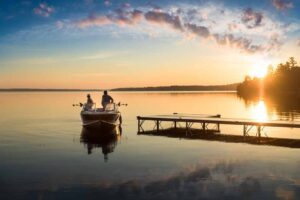
Canada offers a wealth of excellent fishing destinations, so choosing one can be a challenge. However, if you’re looking for a great place to fish in Canada, here are a few options to consider:
1. Vancouver Island, British Columbia: Vancouver Island is a world-renowned fishing destination known for its excellent salmon and halibut fishing. The island’s rugged coastline, numerous bays and inlets, and abundant marine life make it an ideal spot for saltwater and freshwater fishing.
2. Bow River, Alberta: The Bow River is one of Canada’s most famous trout fishing rivers, offering excellent opportunities for fly fishing for brown and rainbow trout. The river flows through the heart of Calgary and is easily accessible for day trips.
3. Lake of the Woods, Ontario: Lake of the Woods is a massive lake in northwestern Ontario known for its excellent fishing for walleye, northern pike, and muskie. The lake has over 14,000 islands and 65,000 miles of shoreline, providing endless fishing opportunities.
4. Gaspé Peninsula, Quebec: The Gaspé Peninsula is a premier destination for Atlantic salmon fishing, with some of the best salmon rivers in the world. The salmon run on the peninsula occurs from June to October, with peak season in July and August.
5. Haida Gwaii, British Columbia: Haida Gwaii, also known as the Queen Charlotte Islands, is a remote archipelago off the coast of British Columbia that offers some of the best salmon fishing in the world. The islands are home to strong runs of chinook, coho, chum salmon, halibut, and lingcod.
These are just a few examples of Canada’s many excellent fishing destinations. Whether you’re a seasoned angler or a beginner, Canada offers endless opportunities for fishing adventures.
What part of Canada has the most fishing?
Canada is a vast country with many fishing opportunities in many different regions. However, some areas of Canada are particularly well-known for their fishing and have a higher concentration of lakes, rivers, and streams popular with anglers.
One of the most popular regions for fishing in Canada is British Columbia. BC is known for its world-class salmon, steelhead fishing, trout, and sturgeon. The province has a vast network of rivers, lakes, and streams that provide excellent fishing opportunities for anglers of all skill levels.
Ontario is another province with a high concentration of fishing opportunities. The province has over 250,000 lakes, rivers, and streams, providing endless fishing possibilities for species like bass, walleye, muskie, and trout.
Manitoba is also a popular destination for fishing, particularly for trophy northern pike and walleye. The province has numerous lakes and rivers that provide excellent fishing opportunities and is home to some of the largest freshwater fish in the world.
Quebec is known for its Atlantic salmon fishing on the Gaspé Peninsula and the North Shore of the St. Lawrence River. The province also has excellent brook trout fishing in its rivers and streams.
In summary, while many parts of Canada offer excellent fishing opportunities, British Columbia, Ontario, Manitoba, and Quebec are particularly well-known for their high concentration of fishing spots and diverse species.
What is the fishing capital of Canada?
Canada doesn’t necessarily have a single fishing capital, as many regions are well-known for their fishing opportunities. However, some places are particularly famous for their fishing and are considered among the top fishing destinations in the country.
One such place is Campbell River, British Columbia, often called the “Salmon Capital of the World.” Located on the east coast of Vancouver Island, Campbell River is known for its excellent salmon fishing, as well as fishing for other species like halibut and lingcod. The city hosts an annual salmon fishing derby, which attracts anglers from around the world.
Another region considered a top fishing destination in Canada is the Bay of Quinte in southeastern Ontario. The bay is known for its world-class walleye fishing and is a popular spot for bass and pike. The area hosts numerous fishing tournaments annually and has a thriving fishing tourism industry.
Other regions that are well-known for their fishing in Canada include the Skeena River in British Columbia (known for its steelhead and salmon fishing), the Miramichi River in New Brunswick (known for its Atlantic salmon fishing), and the Lake of the Woods in Ontario (known for its walleye, northern pike, and muskie fishing).
While Canada may not have one fishing capital, many regions offer exceptional fishing opportunities for anglers of all levels.
Which Canadian province is known for fishing?
Many Canadian provinces are known for their fishing opportunities, as Canada has an abundance of lakes, rivers, and coastlines that offer excellent fishing for various species. However, some provinces are particularly well-known for their fishing, with a higher concentration of fishing opportunities and popular fishing destinations.
British Columbia is one of the provinces with the most robust reputation for fishing in Canada. The province is known for its world-class salmon, steelhead fishing, trout, and sturgeon. BC has a vast network of rivers, lakes, and streams that provide excellent fishing opportunities for anglers of all skill levels.
Ontario is another province that is well-known for its fishing opportunities. With over 250,000 lakes and countless rivers and streams, Ontario offers endless possibilities for fishing, with species including bass, walleye, muskie, and trout.
Quebec is known for its Atlantic salmon fishing on the Gaspé Peninsula and the North Shore of the St. Lawrence River. The province also has excellent brook trout fishing in its rivers and streams.
Manitoba is a popular destination for trophy northern pike and walleye fishing, with numerous lakes and rivers throughout the province that provide excellent fishing opportunities.
Other provinces in Canada with solid reputations for fishing include Alberta, Saskatchewan, Newfoundland, and Labrador.
In summary, while many Canadian provinces offer excellent fishing opportunities, British Columbia, Ontario, Quebec, Manitoba, Newfoundland and Labrador are particularly well-known for their fishing and have a high concentration of fishing opportunities and popular destinations.
What is the best time of year to go fishing in Canada?
Generally, the summer months from June to August are considered the prime fishing season in many parts of Canada. During this time, rivers and lakes teem with various fish species, including trout, salmon, pike, and walleye. Warmer temperatures and longer daylight hours create ideal recreational and sport fishing conditions.
However, it’s important to note that specific regions within Canada may have different peak seasons due to variations in climate and fish migration patterns. For example:
1. British Columbia: Fishing enthusiasts flock to British Columbia during spring (April-May) when salmon species such as Chinook, Coho, and Sockeye return from the ocean to spawn in rivers.
2. Ontario: The summer months (June-August) offer excellent opportunities for bass fishing in Ontario’s lakes, while fall (September-October) is popular for salmon runs.
3. Quebec: Quebec’s Atlantic coastline attracts anglers during summer (June-September), particularly for Atlantic salmon fishing.
To determine the best time of year to go fishing in a specific region of Canada, it is advisable to consult local guides or experienced anglers who have firsthand knowledge of local conditions and fish behaviour. Additionally, watching weather patterns and monitoring fish migration reports can help you plan your trip accordingly.
What are some popular fish species to catch in Canada?
Canada offers various fish species for anglers to catch, including salmon, trout, walleye, pike, muskie, bass, and sturgeon. The specific species available will depend on the region and time of year.
One of the most sought-after fish species in Canada is the Atlantic salmon. Known for its fighting spirit and delicious taste, Atlantic salmon can be found in rivers and estuaries along the eastern coast of Canada. Other popular fish species include rainbow trout, lake trout, brook trout, and brown trout. These species are abundant in many lakes and rivers across the country.
If you prefer freshwater fishing, walleye is a highly prized catch in Canada. Found in numerous lakes and rivers throughout the country, walleye offers both challenge and satisfaction to anglers. Northern pike is another popular freshwater fish known for its aggressive nature and impressive size.
British Columbia’s coastal waters offer exciting opportunities for those who enjoy saltwater fishing. Chinook (king salmon), coho salmon (silver salmon), halibut, and lingcod are popular catches attracting anglers worldwide.
It’s important to note that fishing regulations vary by province and territory in Canada. Before embarking on your fishing adventure, familiarize yourself with local regulations regarding catch limits, seasons, and licensing requirements.
Do I need a fishing license to fish in Canada?
If you plan to go fishing in Canada, it is important to know the regulations regarding fishing licenses. In most cases, you will need a fishing license to fish in Canada legally.
The requirements for obtaining a fishing license can vary depending on the province or territory you plan to fish in. Generally, licenses are required for both residents and non-residents of Canada. The provincial or territorial government typically issues these licenses.
Fishing licenses serve several purposes. They help regulate and manage fish populations, protect the environment, and ensure sustainable fishing practices. The fees collected from fishing licenses often go towards conservation efforts and maintaining fisheries.
It is important to note that different types of fishing licenses may be available depending on factors such as age, duration of stay, and the kind of fish being targeted. Additionally, some regions may have specific rules and regulations regarding catch limits, size restrictions, and designated fishing areas.
To ensure compliance with local regulations and avoid potential penalties or fines, obtaining a valid fishing license is recommended before casting your line in Canadian waters. You can purchase these licenses online or at designated outlets such as bait shops or government offices.
Are catch-and-release regulations in effect in Canada?
Catch-and-release regulations are important for fisheries management in many countries, including Canada. These regulations aim to conserve fish populations by allowing anglers to catch fish for sport or recreational purposes and then release them back into the water unharmed.
In Canada, catch-and-release regulations vary depending on the specific province or territory. Generally, these regulations are in effect to protect certain species of fish or specific bodies of water. They may include restrictions on the size and number of fish that can be caught and kept and guidelines for handling and releasing fish safely.
Anglers must familiarize themselves with the catch-and-release regulations specific to their fishing location in Canada. This information can usually be found on government websites, fishing guides, or by contacting local authorities responsible for fisheries management.
- Yonge-Dundas Square in Toronto is Now Called “Sankofa Square” - December 17, 2023
- Best Western Brooks’ SureStay Plus debuts in Alberta - December 16, 2023
- Air Canada Arrives in Tulum, Mexico as the First Canadian Airline - December 16, 2023
